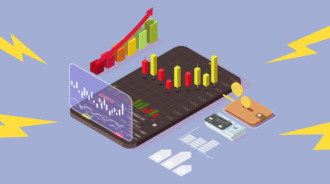

Candlesticks that have a spinning top feature a short body and two long wicks. These candlesticks indicate a situation where neither the seller nor the buyer benefits, meaning that the opening and closing prices are equal. A spinning top candlestick can also signal a potential reversal, especially after a decrease in price. This article provides a comprehensive explanation of spinning top candles, including their differences from Doji candles, examples, and limitations.
What is a spinning top candle?
A spinning top candle is a type of candlestick pattern characterized by a very short body positioned vertically between extended upper and lower shadows. This pattern reflects uncertainty about the future direction of the asset. It implies that neither buyers nor sellers have an advantage.
A spinning top candlestick pattern occurs when buyers push the price up over a certain period, and sellers drive the price down during the same period, but the closing price ends up very close to the opening price. If the next candle confirms a significant price move in either direction, a spinning top candle may indicate a potential price reversal. The closing prices can be higher or lower than the opening prices, but these extremes are always relative to each other.
Note! There are various types of candles. For example, the high wave is a special type of spinning top candle with one or two very long shadows.
What does a spinning top candle mean?
A spinning top candle indicates uncertainty in the price of the asset, while the long upper and lower shadows suggest little change in value from the opening to the closing prices. The price rises as buyers push it higher and falls as sellers push it lower, but ultimately settles at the opening level. This ambiguity may suggest further sideways movement, especially if it occurs within a narrow range. Additionally, it can indicate a potential price reversal if it follows a significant increase or decrease in price.
The spinning top candle is a signal of a potential major trend change and can serve as a warning at the peak of an uptrend. Similarly, a spinning top candle at the bottom of a downtrend may indicate that buyers are gaining control.
Regardless of the scenario, it is beneficial to have supporting evidence for the spinning top pattern. This can be confirmed by observing the next candle. For example, a forex trader who identifies a spinning top candle at the end of an upward movement may anticipate a reversal to the downside, which would be confirmed by a subsequent price drop in the following candle. If this doesn’t occur, the trader should wait for a new signal. If the spinning top occurs within a range, it suggests that uncertainty persists and the range is likely to be maintained. To confirm this, the subsequent candle should move sideways within the current range.
Candlesticks with a spinning top are most effective when used in conjunction with other technical analysis methods. Indicators like the Moving Average Convergence-Divergence (MACD) or Relative Strength Index (RSI) can help identify reversal signals before initiating a trade based on a spinning top candle formation.
Example of a spinning top candlestick
The importance of having a strategy and managing risk becomes more evident when trading with candlesticks. The sample chart displays several spinning top candles. On the left side of the chart, a spinning top pattern occurs when the price experiences a slight decrease. A subsequent downward candle suggests that the price decline will continue. However, the price only falls slightly before reversing back up.
When a certain distance is reached, a second spinning top forms. The fact that the price is fluctuating within a tight range indicates market hesitation.
Compared to the other candles, the third spinning top appears much larger. After the price rises, a large downward candle forms immediately after, indicating a reversal pattern as the price falls.
The falling price leads to the appearance of another rapidly spinning top. The next candle gaps down and continues to fall after a brief pause.
Note! When a spinning top candle forms within a range, it often confirms market uncertainty. Although a spinning top within a trend can be a signal of a reversal, it needs to be confirmed by the following candle.

Differentiating between a spinning top candle and a Doji
Spinning top candles and Doji candles both represent indecision. However, spinning top candles have long upper and lower shadows, while Doji candles have a small real body and small upper and lower shadows. Both patterns are common and can indicate a potential price reversal after a significant price movement.
Both types of candlesticks heavily rely on supporting data. A strong price movement following a spinning top or Doji candle is a stronger signal of a potential new price direction compared to the candles themselves.
The limitations of spinning top candles
Forecasting reversals can be challenging because spinning tops can only spin in one direction. Even if the price moves in a different direction after confirmation, it doesn’t guarantee that it will remain there.
Additionally, setting a stop loss at or below the high or low of a spinning top candle may expose traders to a disproportionate level of risk compared to the potential reward.
Since the candlestick pattern shows neither a price target nor an exit plan, estimating how much you can earn from it is especially challenging. To find a profitable exit, traders need to use additional candlestick patterns and strategies.








